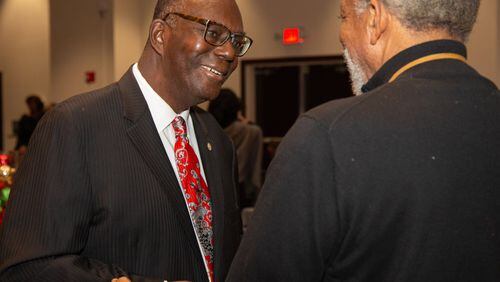A crew arrived Monday morning to move the personal belongings of former Clark Atlanta University president Ronald A. Johnson, whose last day on the job was Friday, who resigned after three-plus years leading one of the largest private universities in Georgia.
Johnson prides himself as someone who can see the future, and he believes he can do more for Historically Black Colleges and Universities such as CAU in some of his current roles, such as on the President Donald Trump’s Board of Advisors of HBCUs, and is anticipating new opportunities.
“All I’m doing is being who I am,” Johnson said in an interview with The Atlanta Journal-Constitution. “I live in the future.”
University trustees have started a search for Johnson's replacement.
Johnson talked for more than one hour Monday about his tenure. Here are excerpts that were edited for brevity.
Q: Why leave now?
A: There are a bunch of reasons. Some very personal. I would say if you look at the charge I was given, every single item in that charge was accomplished and as a result, I did everything I was supposed to do. Moody's had the university on a negative watch, enrollment was stagnant and the university was operating with deficits. All of that has changed. This year, we ended with a cash position of $26 million … The trajectory of the institution has changed and the long-term health of the institution has improved dramatically.
Q: There’s talk that some board members weren’t happy with you. There’s always conversation about that when a president leaves during the middle of the school year. Was there any of that here?
A: If there was, I wasn't engaged in it. The only thing I can tell you is I was given a charge. I overachieved the charge. I had a vision. I implemented the strategies associated with that vision and now, hopefully, leave the institution in good hands.
Q: You implemented a strategy to get students to take at least 15 or more credit hours each semester …
A: It worked tremendously … When I got here, our six-year graduation rate was 38 percent. We lifted it to 40 and now it's at 45 percent.
Q: There’s been concerns that the (office that handles discrimination and sexual misconduct complaints) hasn’t properly handled some complaints and some female coaches have raised concerns that they haven’t been treated fairly. Can you talk about that?
A: The challenge here is, what I heard is, the coordinator and the (Human Resources) department did not receive the complaints until weeks later … It is kind of a murky world. Once it gets to the right people, it gets acted on immediately. (Johnson discussed his efforts in 2016 and 2017 to bring law enforcement leaders on campus to discuss reporting complaints.)
Q: What would you say is your biggest accomplishment?
A: I would say it is being a vision to the institution that the faculty, students and alumni grasped. When I came here, I talked about mobilizing for the future. I used a chess board to symbolize how you have to have the pieces in the right places before you start the game. Then, I talked about ideas that matter … And what we talk about now is lifting every voice and igniting possibilities.
Q: What are some things you say ‘I could have done a better job at this?’
A: A lot of things. In things of resources, I had to prioritize. When I got here, our athletics facilities were in pretty shabby shape, and I wish we could have gotten our track done sooner … I wish I could have done more in terms of providing equity for faculty salaries.
Q: What’s next?
A: I'm working on (Trump's Board of Advisors on Historically Black Colleges and Universities) and the chair of the federal Consumer Finance Protection Bureau Advisory Board (looking at predatory lending of the elderly) … Right now, I'm doing a time-out and in the next year, I'll begin in earnest to start to put together a firm plan.
Here are some statistics about Clark Atlanta University.
Full-time Enrollment: 3,646
Graduation Rate: 45 percent
First- to second-year retention rate: 70 percent
Undergraduate tuition and fees: $23,436
Sources: Clark Atlanta University, Ronald Johnson, U.S. Department of Education







